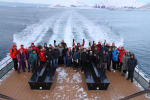The IceCube neutrino detector, embedded in a cubic kilometer of Antarctic ice, searches for high-energy neutrinos from the farthest reaches of outer space. The pristine ice serves as a natural medium for detecting showers of secondary charged particles that result from many neutrino interaction types in the ice. Through a process called Cherenkov radiation, ultraviolet […]
WIPAC
WIPAC news that we’re hiding.
Ibrahim Safa awarded 2023 GNN Dissertation Prize
The 2023 Global Neutrino Network (GNN) Dissertation Prize is awarded to Ibrahim Safa, a postdoctoral research scientist at Nevis Labs of Columbia University. “The GNN dissertation prize recognizes young postdoctoral candidates who have written an outstanding thesis and contributed significantly to the project. Primary criteria of the selection are the scientific quality, the didactics and […]
Carlos Argüelles-Delgado named a 2024 Cottrell Scholar
IceCube collaborator and Harvard University physics professor Carlos Argüelles-Delgado is among 19 outstanding teacher-scholars in chemistry, physics, and astronomy named recipients of the Research Corporation for Science Advancement’s 2024 Cottrell Scholar Awards. Each awardee receives $120,000. Recipients are chosen through a rigorous peer-review process of applications from a wide variety of public and private research […]
First field season for IceCube Upgrade ongoing at the South Pole
Over the past two months, a team of IceCube drill engineers have completed an impressive amount of work during the first of three consecutive field seasons for the IceCube Upgrade. The project is funded by the National Science Foundation and international collaborators. The goal of the project is to drill seven holes in 2025/2026 and […]
Meet IceCube’s 2023-2024 winterovers, Connor and Kalvin!
The time has come for our current winterovers, Marc and Hrvoje, to pass the torch to the new winterovers that arrived at the South Pole last week. As a winterover, individuals brave the unforgiving environment to spend a year—sometimes longer—at the South Pole, half of which is enveloped in complete darkness. Every year, two winterovers […]
SCAR AAA meets above the Arctic Circle for 7th workshop
The seventh meeting of the Scientific Committee on Antarctic Research Astronomy and Astrophysics from Antarctica (SCAR AAA) was held September 19-21, 2023, about 1400 km from the North Pole in the northernmost town in the world, Svalbard, Norway. The three-day workshop brought together dozens of researchers from nine countries to discuss, coordinate, and promote astronomical and astrophysical activities in Antarctica. […]
Carlos Argüelles-Delgado named a 2023 Packard Fellow for Science and Engineering
IceCube collaborator and Harvard physics professor Carlos A. Argüelles-Delgado was named a 2023 Packard Fellow for Science and Engineering. Packard Fellowships are given to early-career scientists and engineers “who are boldly pursuing new areas of research.” As a Packard Fellow, Argüelles will receive $875,000 in unrestricted funds that can be used over five years in […]
Second ThaisCube workshop strengthens partnership between IceCube, Thailand
Last week concluded the 2nd ThaisCube workshop held in Chiang Mai, Thailand, a program that developed from a partnership between Chiang Mai University (CMU) in Thailand, the National Astronomical Research Institute of Thailand (NARIT), and the IceCube Neutrino Observatory. The workshop brought together IceCube researchers, Thai scientists, and aspiring young students. Held on August 8-11, […]
Lu Lu receives 2023 IUPAP Early Career Scientist Prize
IceCube collaborator Lu Lu received a 2023 International Union of Pure and Applied Physics (IUPAP) Early Career Scientist Prize “for her contributions to the development of high energy neutrino astronomy in the PeV energy region.” Lu accepted the award on July 27 during the opening ceremony at the 38th International Cosmic Ray Conference (ICRC) held […]
IceCube search for sub-TeV neutrino emission associated with LIGO/Virgo gravitational waves
Gravitational waves (GWs) are produced by some of the most extreme astrophysical phenomena, such as black hole and neutron star mergers. They have long been suspected as astrophysical sources of neutrinos, ghostlike cosmic messengers hurtling through space unimpeded. Thus far, common astrophysical sources of neutrinos and photons, as well as common sources of gravitational waves […]








